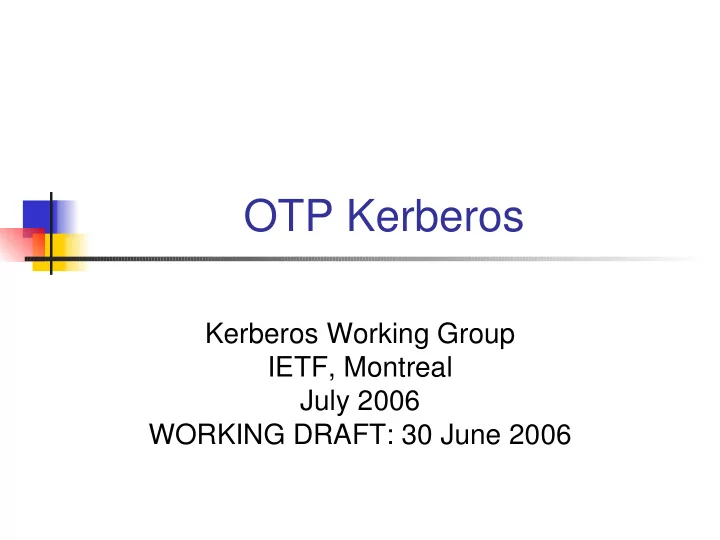

OTP Kerberos Kerberos Working Group IETF, Montreal July 2006 WORKING DRAFT: 30 June 2006
Background Proposal is to define extensions to Kerberos V5 (rfc4120) to support pre-authentication using an OTP Three main aims: Allow an OTP to be used without a password in pre- authentication Support both connected and disconnected tokens Support multiple OTP algorithms Part of One-Time Password Specification (OTPS) series of documents on aspects of OTP usage and integration Inspired by expired I-D draft-ietf-cat-kerberos- passwords-04 and draft-ietf-krb-wg-kerberos-sam-03
Comparison with Expired Draft Designed to support both connected and disconnected tokens Previous proposal aimed at disconnected tokens. Supported token type but not key identifier. Designed to support multiple OTP algorithms Counter Challenge-response Time Time + counter etc. Uses hardening value to harden OTP Previous proposal recommends use of password with OTP to harden key. New proposal is to combines OTP with hardening value using PBKDF2 Current proposal only supports case where KDC can generate OTP Cannot support basic S/Key Use Ephemeral D-H to transport OTP value? Supports PIN change using password change extension (rfc3244)
Approach Information on how to generate OTP sent in challenge from KDC Client uses OTP to generate encryption key Key used to encrypt timestamp as in standard password pre-auth OTP hardened using hardening value generated by KDC
Pre-authentication Exchange Client KDC KRB_AS_REQ KRB_ERROR PA-OTP-CHALLENGE & PA-ETYPE-INFO2 KRB_AS_REQ PA-OTP-RESPONSE & PA-ENC-TIMESTAMP KRB_AS_REP PA-OTP-CONFIRM & PA-OTP-PIN-CHANGE
Pre-authentication Exchange Client sends initial KRB_AS_REQ possibly containing password-based pre-auth. KDC responds with KRB_ERROR containing: PA-OTP-CHALLENGE indicating how OTP is to be generated PA-ETYPE-INFO2 indicating how key is to be generated Client generates OTP and uses it to generate encryption key Client sends second KRB_AS_REQ to KDC containing PA-OTP-RESPONSE with information on how OTP was generated PA-ENC-TIMESTAMP containing encrypted timestamp KDC validates pre-authentication data and returns KRB_AS_REP PA-OTP-CONFIRM containing OTP hardening value PA-ENC-PIN containing new PIN for the user
PA-OTP-CHALLENGE PA-OTP-CHALLENGE ::= SEQUENCE { flags ChallengeFlags otp-challenge[0] OCTET STRING OPTIONAL, otp- length [1] INTEGER OPTIONAL, otp- service [2] UTF8String OPTIONAL, otp- keyID [3] OCTET STRING OPTIONAL, otp- algID [4] INTEGER OPTIONAL }
PA-OTP-RESPONSE PA-OTP-RESPONSE ::= SEQUENCE { iterationCount[0] INTEGER OPTIONAL, identifier [1] OCTET STRING OPTIONAL, otp-challenge [2] OCTET STRING OPTIONAL, otp-time [2] KerberosTime OPTIONAL, otp-counter [3] OCTET STRING OPTIONAL, otp-format [4] OTPFormat OPTIONAL, otp-keyID [5] OCTET STRING OPTIONAL } OTPFormat ::= INTEGER { decimal(0), hexadecimal(1), alphanumeric(2), binary(3) }
Key Generation KDC MUST support at least one of the encryption types aes128-cts-hmac-sha1-96 aes256-cts-hmac-sha1-96 KDC’s KRB_ERROR contains PA-ETYPE-INFO2 containing etype, salt iteration count in the s2kparams Encryption key generated using as defined in RFC3962 using PBKDF2 but with addition of hardening value tkey = random-to-key(PBKDF2(OTP, salt|hardening, iteration_count, key_length)) key = DK(tkey, "kerberos")
Hardening Value Hardening value to be used by client sent by KDC in PA-OTP-CONFIRM in KRB_AS_REP Client stores hardening value associated with KDC If the client has a hardening value then an iteration count of 1 used Full iteration count used if no hardening value (e.g. first authentication) Identifier of value used included in PA-OTP- RESPONSE
PA-OTP-CONFRIM PA-OTP-CONFIRM ::= SEQUENCE { identifier OCTET STRING, encHardeningValue EncryptedData -- EncHardeningValue } EncHardeningValue ::= OCTET STRING SIZE (16..MAX)
PIN Change KDC can return PA-OTP-PIN-CHANGE in KRB_AS_REP Contents encrypted using current user key Can contain new PIN that user must use Can also instruct user that their PIN must be changed User PIN changed handled using ChangePasswdData from RFC3244
PA-OTP-PIN-CHANGE PA-ENC-PIN ::= EncryptedData --PA- ENC-PIN-ENC PA-ENC-PIN-ENC ::= SEQUENCE { flags PinFlags pin [0] UTF8String OPTIONAL minLength [1] INTEGER OPTIONAL maxLength [2] INTEGER OPTIONAL } PinFlags ::= KerberosFlags -- systemSetPin (0)
Next Steps Solicit WG discussion on approach Resolve S/Key issue Ephemeral D-H? Extend to support re-synchronizing of tokens
Recommend
More recommend